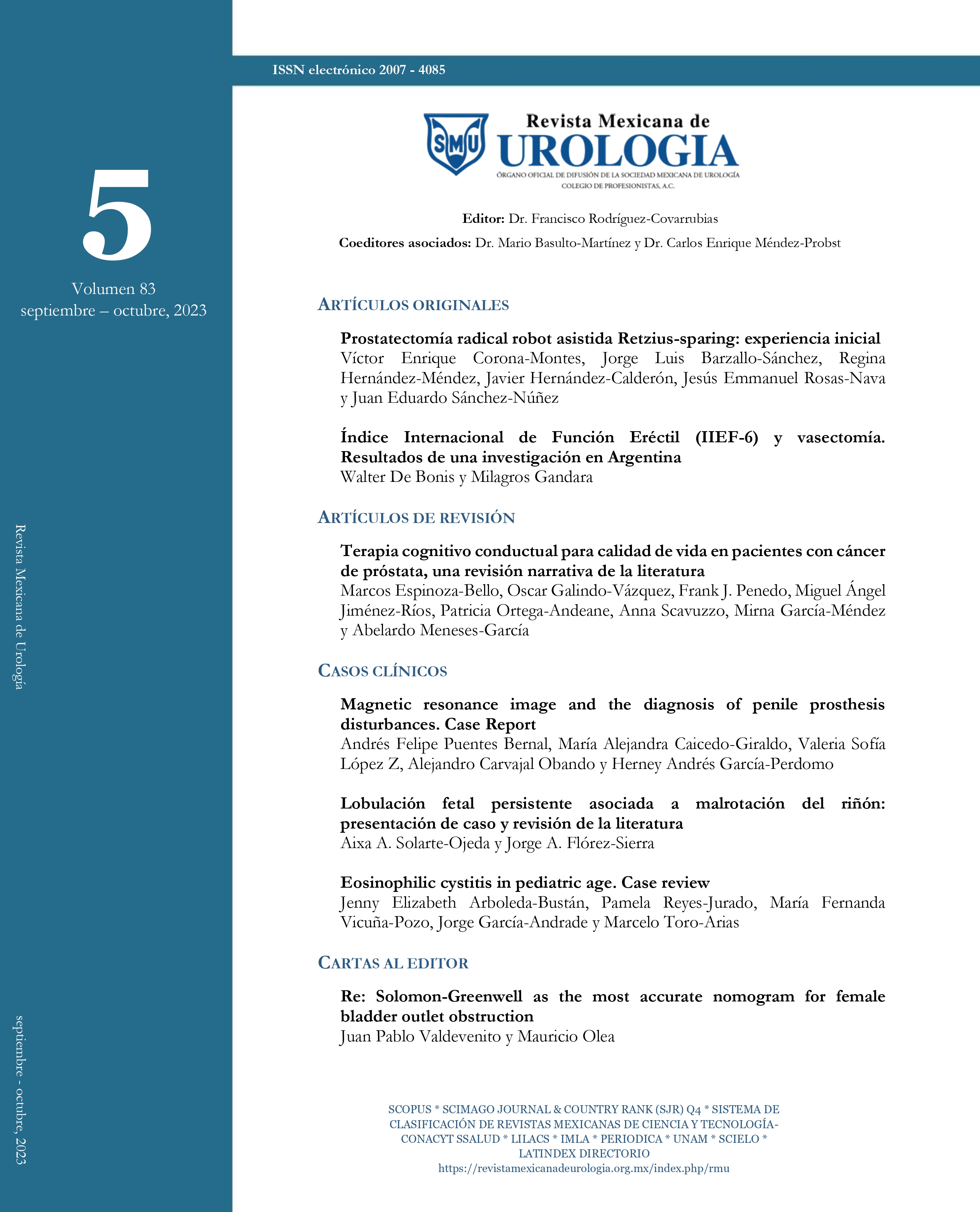Retzius-sparing robot-assisted radical prostatectomy: initial experience
DOI:
https://doi.org/10.48193/revistamexicanadeurologa.v83i5.1061Keywords:
Retzius-Sparing, Robotic Surgery, Prostate CancerAbstract
Introduction: Robot-Assisted Radical Prostatectomy has positioned itself as the approach of choice in the treatment of prostate cancer.
Objective: of this study is to describe our experience with the Retzius-sparing technique started in 2018.
Material and methods: to describe the perioperative, functional and oncological outcomes of 13 patients who were taken to the Retzius space-preserving approach in patients with cancer of the prostate, evaluating perioperative variables, perioperative outcome, pathology, urinary continence, sexual function and oncological control. SPPS Windows V 22 was used for the statistical description.
Results: age of 64.9 years, specific prostate antigen of 25.85 ng/dl, pre-surgical IPSS 61% had mild symptoms, 30% moderate and 7% severe symptoms, the risk groups corresponded to low in 15%, intermediate 38% and high 46%. 6 patients two pT2 and four pT3 of which 4 received three-dimensional external conformal radiotherapy and two radiotherapy plus total androgen deprivation.
Conclusions: a slight tendency to control early urinary continence has been observed with the Retzius-sparing technique, but over time the continence rates are equalized.
References
Abrams P, Andersson KE, Birder L, Brubaker L, Cardozo L, Chapple C, et al. Fourth International Consultation on Incontinence Recommendations of the International Scientific Committee: Evaluation and treatment of urinary incontinence, pelvic organ prolapse, and fecal incontinence. Neurourol Urodyn. 2010;29(1):213–40. doi: https://doi.org/10.1002/nau.20870
Galfano A, Ascione A, Grimaldi S, Petralia G, Strada E, Bocciardi AM. A new anatomic approach for robot-assisted laparoscopic prostatectomy: a feasibility study for completely intrafascial surgery. Eur Urol. 2010;58(3):457–61. doi: https://doi.org/10.1016/j.eururo.2010.06.008
Wolfram M, Bräutigam R, Engl T, Bentas W, Heitkamp S, Ostwald M, et al. Robotic-assisted laparoscopic radical prostatectomy: the Frankfurt technique. World J Urol. 2003;21(3):128–32. doi: https://doi.org/10.1007/s00345-003-0346-z
Corona-Montes VE, González-Cuenca E, Fernández-Noyola G, Rueda-Loaiza JA, Ramírez-Muciño JA, Vázquez-Lavista LG. Robot-Assisted Radical Prostatectomy our Technique Description. JUNS. 21 de octubre de 2020;3(1):236-41. doi: https://doi.org/10.32474/juns.2020.03.000153
Tobias-Machado M, Corona Montes VE, Hidaka AK, Taha A, Nunes-Silva I, Zampolli H de C. Retzius Sparing Robot-Assisted Radical Prostatectomy Applied to High-Risk Prostate Cancer: Detailed Surgical Steps to Achieve a Complete Extrafascial Surgery. Videoscopy. 2021;31(1). doi: https://doi.org/10.1089/vor.2020.0669
Fuentes GT. Aplicación de la escala internacional de síntomas prostáticos a adultos mayores. Medimay. 2010;16(1):37–47.
Rosen RC, Cappelleri JC, Gendrano N. The International Index of Erectile Function (IIEF): a state-of-the-science review. Int J Impot Res. 2002;14(4):226–44. doi: https://doi.org/10.1038/sj.ijir.3900857
Bristol Urological Institute. International Consultation on Incontinence Questionnaire-Urinary Incontinence Short Form (ICIQ-UI SF). 2004.
Patel VR, Sandri M, Grasso AAC, De Lorenzis E, Palmisano F, Albo G, et al. A novel tool for predicting extracapsular extension during graded partial nerve sparing in radical prostatectomy. BJU International. 2018;121(3):373–82. doi: https://doi.org/10.1111/bju.14026
Yılmaz K, Özsoy Ç, Ölçücü MT, Aksaray EE, Okuducu Y, Ateş M. Is Retzius-sparing robot-assisted laparoscopic radical prostatectomy effective in early continence? A single-center experience of the first 50 patients. Turk J Urol. 2021;47(2):125–30. doi: https://doi.org/10.5152/tud.2020.20411
Galfano A, Tappero S, Eden C, Dell’oglio P, Fransis K, Guo H, et al. Multicentric experience in Retzius-sparing robot-assisted radical prostatectomy performed by expert surgeons for high-risk prostate cancer. Minerva Urol Nephrol. octubre de 2022;74(5):607-14. doi: https://doi.org/10.23736/s2724-6051.22.04857-1
Kishore TA, Kuriakose MJ, Raveendran V, Ramaprasad MK. The impact of transition from conventional robot-assisted radical prostatectomy to retzius sparing robot-assisted radical prostatectomy: A retrospective multivariate analysis. Indian J Urol. 2021;37(2):140–6. doi: https://doi.org/10.4103/iju.iju_414_20
Downloads
Published
Issue
Section
License
Copyright (c) 2023 Revista Mexicana de Urología

This work is licensed under a Creative Commons Attribution-NonCommercial-NoDerivatives 4.0 International License.






